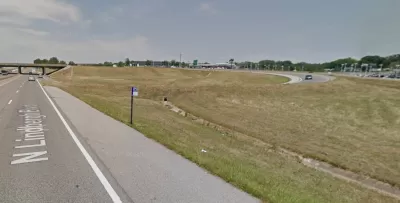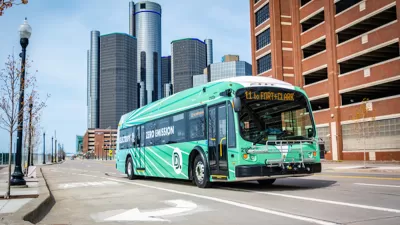While that headline might seem obvious, how many well-located, pleasant bus stops are you aware of?

"A new study published by the Transportation Research Board finds transit riders perceive waiting times to be longer if they’re at a stop with heavy traffic and high levels of pollution," according to an article.
Schmitt shares a post by blogger Tim Kovach, who analyzes the study relative to a recent decision by the city of Cleveland to remove bus routes from the recently redesigned Public Square. Kovach also provides additional insight into the findings of the study.
David Levinson, one of the authors of the report, also shared some of the study's findings about the user experience of transit stops, excerpting a passage and a graph from the study. The study is available on the University of Minnesota Digital Conservancy website.
FULL STORY: The Wait for the Bus Feels Longer If Your Stop Is Near Heavy Traffic

Americans May Be Stuck — But Why?
Americans are moving a lot less than they once did, and that is a problem. While Yoni Applebaum, in his highly-publicized article Stuck, gets the reasons badly wrong, it's still important to ask: why are we moving so much less than before?

Using Old Oil and Gas Wells for Green Energy Storage
Penn State researchers have found that repurposing abandoned oil and gas wells for geothermal-assisted compressed-air energy storage can boost efficiency, reduce environmental risks, and support clean energy and job transitions.

Placekeeping: Setting a New Precedent for City Planners
How a preservation-based approach to redevelopment and urban design can prevent displacement and honor legacy communities.

Colorado Lawmakers Move to Protect BRT Funding
In the face of potential federal funding cuts, CDOT leaders reasserted their commitment to planned bus rapid transit projects.

Safe Streets Funding in Jeopardy
The Trump administration is specifically targeting bike infrastructure and other road safety projects in its funding cuts.

Six Reasons Why Housing Is a Human Right
Is housing a human right? A law professor shares six reasons why it should be, from its role in protecting other rights to global recognition and U.S. legal traditions. As public support grows, could housing be the next right written into law?
Urban Design for Planners 1: Software Tools
This six-course series explores essential urban design concepts using open source software and equips planners with the tools they need to participate fully in the urban design process.
Planning for Universal Design
Learn the tools for implementing Universal Design in planning regulations.
Heyer Gruel & Associates PA
City of Moreno Valley
Institute for Housing and Urban Development Studies (IHS)
City of Grandview
Harvard GSD Executive Education
Salt Lake City
NYU Wagner Graduate School of Public Service
City of Cambridge, Maryland





























